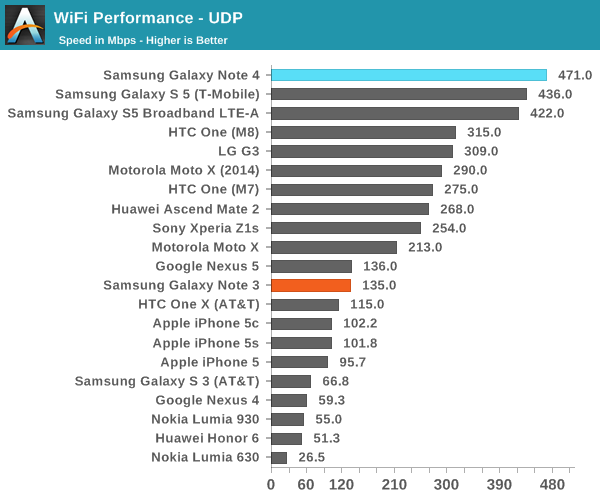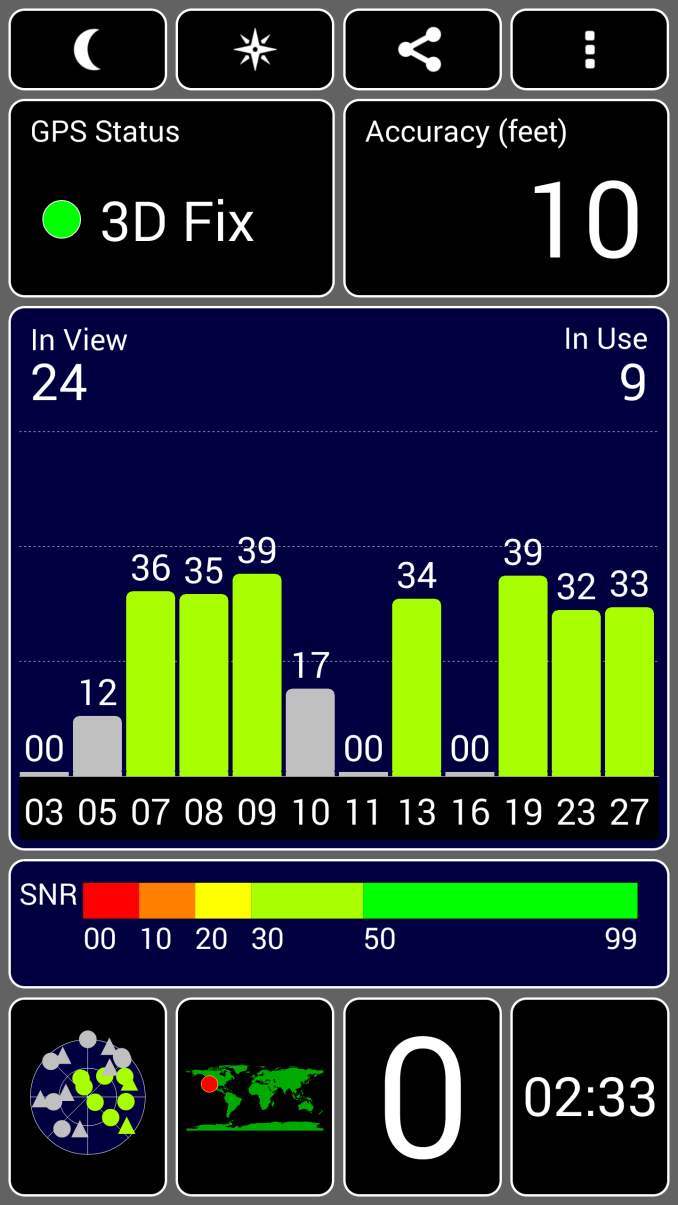The Samsung Galaxy Note 4 Review
by Joshua Ho on October 15, 2014 9:00 AM EST- Posted in
- Smartphones
- Samsung
- Android
- Mobile
- Galaxy Note 4
WiFi Performance
While the Galaxy S5 LTE-A Broadband had a Qualcomm Atheros solution (QCA6174), the Note 4 moves back to Broadcom's WiFi solution. In this case, we see the BCM4358, which is a revision of the BCM4354 that was first seen with Samsung's Galaxy S5. This shouldn't have any major differences outside of improved Bluetooth coexistence but antenna design can and does change between revisions. In order to test this, we use iperf and Asus' RT-AC68U router to try and achieve maximum performance.

As one can see, the Galaxy Note 4 has a strong showing in this test, easily surpassing every other device we have available for testing.
GNSS
At this point, it really goes without saying that the GNSS solution of choice is the one built into Qualcomm's modem. This allows for fixes based upon initial location and time data that the modem has, and therefore in practice every GPS fix is a hot fix and takes around 5 seconds for a lock in good conditions. In the case of the Note 4, with airplane mode on and no assistance data I saw that it took around 50 seconds to achieve a lock, but this is strongly dependent upon environmental conditions. Once locked, I found that the Note 4 had quite a strong lock and quickly went down to 10 foot accuracy level without issue.
Misc
Similar to the new Moto X we see a Cypress CapSense solution in the Note 4 but this is likely used for the capacitive buttons rather than any impedance-matching antenna tuner. The UV sensor appears to be a Maxim design win, although there's no information on the specific part. The battery's fuel gauge is also a Maxim part, as is the speaker amplifier and pulse sensor. The NFC chip used is NXP's PN547, so host card emulation should be supported and therefore Google Wallet's tap and pay system should work as well.











195 Comments
View All Comments
darkich - Wednesday, October 15, 2014 - link
Yep, different approach to low power design.Apple use just two underclocked but very beefed up, large cores, while Qualcomm uses more small, simple, but high clocked cores.
Just think about the fact that Snapdragon 805 probably doesn't draw more power than the A8, even while being clocked twice higher and built on a larger node.
If you doubt that, the Galaxy Note 4 itself is your proof - longer battery endurance than iPhone 6+(according to every other review) despite of having a modestly larger battery, supposedly less efficient OS, triple the RAM, bigger screen and larger resolution panel.
There's probably no way it could achieve that if snapdragon 805 was any less efficient than A8
darkich - Wednesday, October 15, 2014 - link
One more thing.. the CPU benchmarks posted here are nothing but a single threaded Web scripts. Which means, almost entirely dependant on software optimization and single core performance.If you want a good raw performance indication of the CPU setup itself, look up Geekbench.
There the Snapdragon 805 easily beats the A8 in overall score.
The A8 beats it even more easily in the single core part though.
KPOM - Wednesday, October 15, 2014 - link
Not many apps are designed for multicore support. Also, Apple chips run at top speed for longer. It's like comparing Carl Lewis to Paula Radcliffe. Lewis can run faster for short bursts but Radcliffe has more endurance and is still running at the top of her game after 26.2 miles.KPOM - Wednesday, October 15, 2014 - link
Not necessarily. The biggest drain on the battery is the screen. OLED is more efficient than LCD. So perhaps the Qualcomm CPU is less efficient but Samsung makes it up in the display. Now that Samsung seems to have solved the saturation issue perhaps the real story is that if Apple and Samsung were still partners instead of frenemies the battery life on the latest iPhones would be absolutely amazing instead of just good considering the smaller batteries they use.tralalalalalala40 - Saturday, October 18, 2014 - link
not more efficient when browsing the web (white background)tralalalalalala40 - Saturday, October 18, 2014 - link
Because you were lied to by a 100 billion dollar marketing machine. more megapixels is not better (if you don't account for pixel size etc.). more RAM is not better (if you don't account for fast memory compression techniques). more clock speed is not better (if you don't account for electromigration and current leakage, etc. in the transistors).techcrazy - Wednesday, October 15, 2014 - link
Samsung amoled display doesn't appear as sharp as other LCD display. It's because of their PenTile subpixel layout. Their PentTile subpixel layout is lower than a conventional RGB stripe, so true subpixel density increases around 20%. - So basically Samsung's QHD display only 20% sharper than FHD display which has RGB stripe where as LG's QHD display is nearly 80% sharper than FHD display which has RGB stripe. LG's QHD display is the true QHD display and Samsung's QHD is the fake QHD display.grayson_carr - Wednesday, October 15, 2014 - link
Doesn't change the fact that the G3 display isn't very well calibrated, has very poor contrast, and has a terrible oversharpening algorithm that makes things look weird.MattL - Wednesday, October 15, 2014 - link
Good review... two things though:1) Your screen analysis results differ from display mate in an oddly large way, different review unit calibrations maybe? They found it to rate much better on accuracy results than here.
2) Battery life results differ a bit than most other sites, they find the note 4 does better than the iPhone 6. In fairness the web browsing results is where it rates the lowest which is where the iPhone 6 barely beats it here, so that doesn't different too much.
Why don't you do a video battery life test? Or a mixed content test. These are areas that OLED screens should do much better due to white screen vs black energy efficiency, something display mate analyzed in much more detail.
Arcetnathon7 - Wednesday, October 15, 2014 - link
Don't you think strange that diplaymate submit the test weeks before the launch ?Same thing with Galaxy Alpha and GSMarena review.
I really suspect Samsung chosing prototypes. Every other review after launch never meet those results.